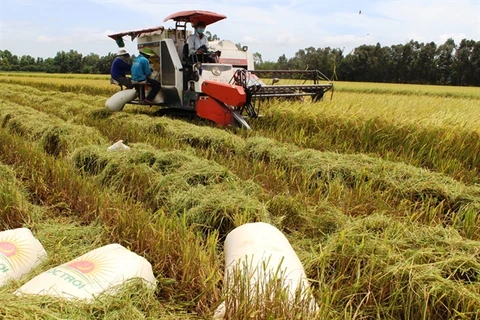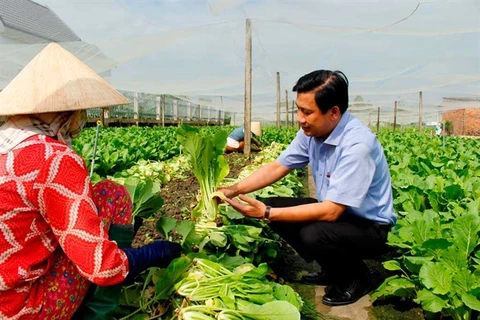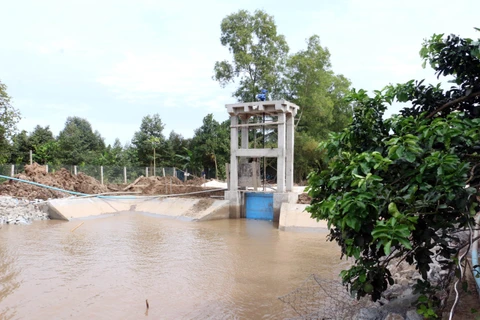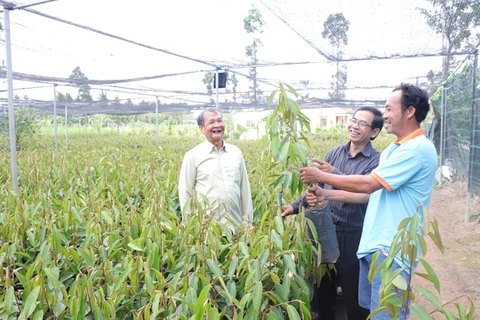Ben Tre (VNS/VNA) - Farmers in Ben Tre province’s Cho Lach district are boosting production of seedlings for all kinds of crops to make up for those damaged by drought and saltwater intrusion during the just-ended dry season.
The district, the country’s largest seedling producer, is entering the rainy season like the rest of the Mekong Delta.
Nguyen Thi Hong from the district’s Tan Lieng commune said the number of seedlings she had grown this year was only equal to 60 percent of last year’s because of the saltwater intrusion and lack of water for irrigation.
She was growing more to meet the market demand, she said.
But a big difficulty was the shortage of plants required for grafting because of the damage caused by the drought and saltwater, she said.
She had spent more than 150 million VND (6,500 USD) to buy water but still could not save many of her seedlings.
Besides grafting, farmers here also produce seedlings by growing from rooted cuttings, seeds and air layering.
To ensure they have plants for grafting now many farmers had to grow them elsewhere in the delta during the last dry season and transport them to the district.
Dang Van Mi of the district’s Long Thoi commune said he had to grow plants in provinces like An Giang, Vinh Long and Dong Thap to ensure he would have plants available to graft seedlings to sell come the rainy season.
Seedling prices have doubled from 12 months ago because of the lack of supply, according to traders.
Many like jackfruit, avocado and coconut are in high demand now.
Cho Lach produces more than 30 million seedlings a year with the main season being the beginning of the rainy season in May, according to the district’s Bureau of Agriculture and Rural Development.
However, the output this year was only 10 percent of last year, said Bui Thanh Liem, head of the bureau.
But farmers were increasing production and would have enough to supply to the market in two to three months, he said.
District authorities have taken many measures to help farmers overcome the adverse impacts of the drought and saltwater intrusion, and taught them techniques to grow seedlings.
The district’s seedlings, mostly for fruit trees, are sold all over the country./.
The district, the country’s largest seedling producer, is entering the rainy season like the rest of the Mekong Delta.
Nguyen Thi Hong from the district’s Tan Lieng commune said the number of seedlings she had grown this year was only equal to 60 percent of last year’s because of the saltwater intrusion and lack of water for irrigation.
She was growing more to meet the market demand, she said.
But a big difficulty was the shortage of plants required for grafting because of the damage caused by the drought and saltwater, she said.
She had spent more than 150 million VND (6,500 USD) to buy water but still could not save many of her seedlings.
Besides grafting, farmers here also produce seedlings by growing from rooted cuttings, seeds and air layering.
To ensure they have plants for grafting now many farmers had to grow them elsewhere in the delta during the last dry season and transport them to the district.
Dang Van Mi of the district’s Long Thoi commune said he had to grow plants in provinces like An Giang, Vinh Long and Dong Thap to ensure he would have plants available to graft seedlings to sell come the rainy season.
Seedling prices have doubled from 12 months ago because of the lack of supply, according to traders.
Many like jackfruit, avocado and coconut are in high demand now.
Cho Lach produces more than 30 million seedlings a year with the main season being the beginning of the rainy season in May, according to the district’s Bureau of Agriculture and Rural Development.
However, the output this year was only 10 percent of last year, said Bui Thanh Liem, head of the bureau.
But farmers were increasing production and would have enough to supply to the market in two to three months, he said.
District authorities have taken many measures to help farmers overcome the adverse impacts of the drought and saltwater intrusion, and taught them techniques to grow seedlings.
The district’s seedlings, mostly for fruit trees, are sold all over the country./.
























